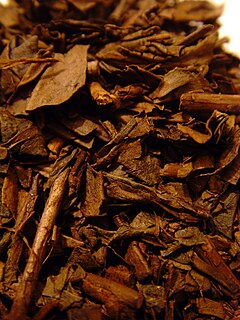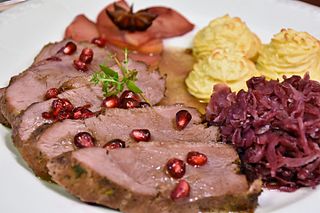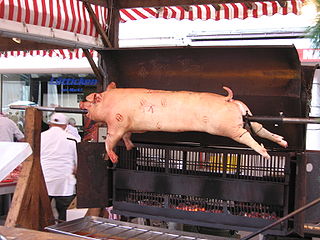
Roasting is a cooking method that uses dry heat where hot air covers the food, cooking it evenly on all sides with temperatures of at least 150 °C (300 °F) from an open flame, oven, or other heat source. Roasting can enhance the flavor through caramelization and Maillard browning on the surface of the food. Roasting uses indirect, diffused heat, and is suitable for slower cooking of meat in a larger, whole piece. Meats and most root and bulb vegetables can be roasted. Any piece of meat, especially red meat, that has been cooked in this fashion is called a roast. Meats and vegetables prepared in this way are described as "roasted", e.g., roasted chicken or roasted squash.

Peking duck is a dish from Beijing (Peking) that has been prepared since the Imperial era. The meat is characterized by its thin, crisp skin, with authentic versions of the dish serving mostly the skin and little meat, sliced in front of the diners by the cook. Ducks bred specially for the dish are slaughtered after 65 days and seasoned before being roasted in a closed or hung oven. The meat is often eaten with spring onion, cucumber and sweet bean sauce with pancakes rolled around the fillings. Sometimes pickled radish is also inside, and other sauces can be used.

Turducken is a dish consisting of a deboned chicken stuffed into a deboned duck, further stuffed into a deboned turkey. Outside of the United States and Canada, it is known as a three bird roast. Gooducken is a traditional English variant, replacing turkey with goose.

Roast chicken is chicken prepared as food by roasting whether in a home kitchen, over a fire, or with a rotisserie. Generally, the chicken is roasted with its own fat and juices by circulating the meat during roasting, and therefore, are usually cooked exposed to fire or heat with some type of rotary grill so that the circulation of these fats and juices is as efficient as possible. Roast chicken is a dish that appears in a wide variety of cuisines worldwide.

Rotisserie, also known as spit-roasting, is a style of roasting where meat is skewered on a spit – a long solid rod used to hold food while it is being cooked over a fire in a fireplace or over a campfire, or roasted in an oven. This method is generally used for cooking large joints of meat or entire animals, such as pigs or turkeys. The rotation cooks the meat evenly in its own juices and allows easy access for continuous basting.

Hōjicha is a Japanese green tea. It is distinctive from other Japanese green teas because it is roasted in a porcelain pot over charcoal, whereas most Japanese teas are steamed. The tea is fired at a high temperature, altering the leaf color tints from green to reddish brown. The process was first performed in Kyoto, Japan, in the 1920s and its popularity persists today.

Home roasting is the process of roasting coffee from green coffee beans on a small scale for personal consumption. Home roasting of coffee has been practiced for centuries, using simple methods such as roasting in cast iron skillets over a wood fire and hand-turning small steel drums on a kitchen stovetop.
Roasting is a form of humor in which a specific individual is voluntarily or involuntarily, subjected to insulting jokes and ridicule by one or more people, usually intended to amuse a wider audience or to humiliate and anger the roasted individual. Roasting can be often used as a form of cyberbullying or bullying amongst pre-teens and teens who are involuntarily roasted. Roasting can also be organized into public events that are intended to honor a specific individual in a unique way. In addition to jokes and insult comedy, such events may also involve genuine praise and tributes. The implication of a public roast event is that the roastee is able to take the jokes in good humor and not as serious criticism or insult. The individual is surrounded by friends, fans, and well-wishers, who can receive some of the same treatment as well during the course of the evening. The party and presentation itself are both referred to as a "roast". The host of the event is called the "roastmaster". Anyone who is mocked in such a way is said to have been "roasted".

White coffee can refer to any of a number of different kinds of coffees or coffee substitutes worldwide.

In cooking and gastronomy, duck or duckling is the meat of several species of bird in the family Anatidae, found in both fresh and salt water. Duck is eaten in many cuisines around the world. It is a high-fat, high-protein meat rich in iron. Duckling nominally comes from a juvenile animal, but may be simply a menu name.

Roasting coffee transforms the chemical and physical properties of green coffee beans into roasted coffee products. The roasting process is what produces the characteristic flavor of coffee by causing the green coffee beans to change in taste. Unroasted beans contain similar if not higher levels of acids, protein, sugars, and caffeine as those that have been roasted, but lack the taste of roasted coffee beans due to the Maillard and other chemical reactions that occur during roasting.

Siu mei is the generic Cantonese name of meats roasted on spits over an open fire or a large wood-burning rotisserie oven. It creates a unique, deep barbecue flavor and the roast is usually coated with a flavorful sauce before roasting. Siu mei is very popular in Hong Kong and Macau, and overseas Chinatowns especially with Cantonese emigrants. In Hong Kong, the average person eats siu mei once every four days, with char siu being the most popular, followed by siu yuk in second, and roast goose being third. Siu mei is also known colloquially as siu laap, as the latter term encompasses siu mei, lou mei, and other Cantonese-style cooked and preserved meats.

Doutor Coffee (株式会社ドトールコーヒー) is a Japanese retail company that specializes in coffee roasting and coffee shop franchising. It was founded by Toriba Hiromichi.

Roast goose is a dish found in Chinese, European, and Middle Eastern cuisines. The goose is in the biological family of birds including ducks, geese, and swans, known as the family of Anatidae. The family has a cosmopolitan distribution. Roasting is a cooking method using dry heat with hot air enveloping the food, cooking it evenly on all sides. Roasting can enhance flavor. Many varieties of roast goose appear in cuisines around the world.

Roasting is a process of heating a sulphide ore to a high temperature in presence of air. It is a step of the processing of certain ores. More specifically, roasting is a metallurgical process involving gas–solid reactions at elevated temperatures with the goal of purifying the metal component(s). Often before roasting, the ore has already been partially purified, e.g. by froth flotation. The concentrate is mixed with other materials to facilitate the process. The technology is useful but is also a serious source of air pollution.

A pig roast or hog roast is an event or gathering which involves the barbecuing of a whole pig.

Dry roasting is a process by which heat is applied to dry foodstuffs without the use of oil or water as a carrier. Unlike other dry heat methods, dry roasting is used with foods such as nuts and seeds, in addition to some eaten insects such as house crickets. Dry-roasted foods are stirred as they are roasted to ensure even heating.

A roasting pan is a piece of cookware used for roasting meat in an oven, either with or without vegetables or other ingredients. A roasting pan may be used with a rack that sits inside the pan and lets the meat sit above the fat and juice drippings.

The Burn with Jeff Ross is a comedy panel show hosted by comedian Jeff Ross that aired on Comedy Central. The show debuted on August 14, 2012, and was executive produced by Ross himself. The program featured Ross roasting a wide variety of targets, along with guest appearances by fellow comedians who make up a panel of roasters. The show was renewed for a second season by Comedy Central, which premiered January 8, 2013.

4-Caffeoyl-1,5-quinide is found in roasted coffee beans. It is formed by lactonization of 4-O-caffeoylquinic acid during the roasting process.


















